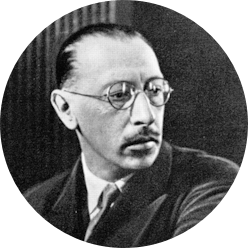
Игорь Стравинский
17 июня 1882 г. - Ораниенбаум — 6 апреля 1971 г. - Нью-Йорк
About
Игорь Стравинский: русское влияние
Игорь Стравинский, не поддающийся классификации композитор, с раннего возраста был приобщен к музыке, в частности благодаря своему отцу, который был известным басом в Санкт-Петербургской опере. От Николая Римского-Корсакова, одного из своих учителей, он унаследовал оркестровую роскошь, и его первые произведения были пронизаны сверкающими красками русского фольклора. Его встреча с Дягилевым, который заказал балет «Жар-птица» (1910), определила будущее молодого композитора. Стравинский начал путешествовать, и его дерзкое и озадачивающее искусство сделало его известным за пределами российских границ.
Творчество Игоря Стравинского: вечная ссылка на современность
Балеты Игоря Стравинского произвели сенсацию в Париже. Хотя Дебюсси, Равель и Шмитт были в восторге от композитора, первое представление «Весны священной» в 1913 году в новом Театре Елисейских полей вызвало один из величайших скандалов в истории искусства. Никогда не ограничивая свой музыкальный язык, Стравинский провел годы Первой мировой войны в Швейцарии, интегрируя джаз в свою вселенную и создавая новые партитуры чистой простоты.
Музыка Игоря Стравинского не поддается классификации, но всегда была ориентиром для современности, оригинальности и изобретательности. Будь то музыкальные пастиши «Пульчинеллы», религиозное рвение его Мессы (1951) или серийные и современные техники в Canticum Sacrum, Стравинский не поддается определению. С его резким юмором или жестокими ритмами, музыка Стравинского была необходима для будущих поколений. В изгнании в Калифорнии с 1939 года, Стравинский умер в 1971 году в возрасте восьмидесяти девяти лет. Он был похоронен в Венеции, городе, который он больше всего любил.

